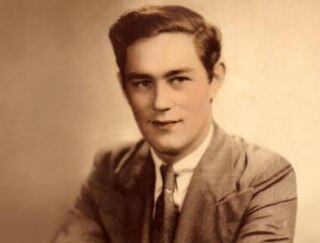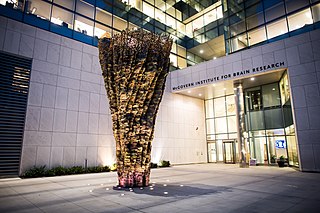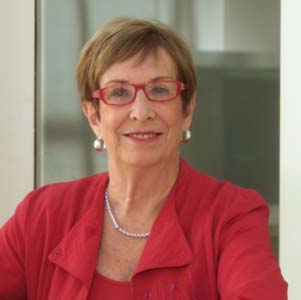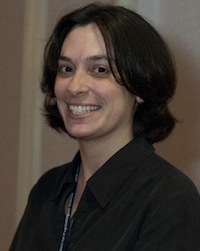Related Research Articles

Cognitive neuroscience is the scientific field that is concerned with the study of the biological processes and aspects that underlie cognition, with a specific focus on the neural connections in the brain which are involved in mental processes. It addresses the questions of how cognitive activities are affected or controlled by neural circuits in the brain. Cognitive neuroscience is a branch of both neuroscience and psychology, overlapping with disciplines such as behavioral neuroscience, cognitive psychology, physiological psychology and affective neuroscience. Cognitive neuroscience relies upon theories in cognitive science coupled with evidence from neurobiology, and computational modeling.

Cognitive neuropsychology is a branch of cognitive psychology that aims to understand how the structure and function of the brain relates to specific psychological processes. Cognitive psychology is the science that looks at how mental processes are responsible for the cognitive abilities to store and produce new memories, produce language, recognize people and objects, as well as our ability to reason and problem solve. Cognitive neuropsychology places a particular emphasis on studying the cognitive effects of brain injury or neurological illness with a view to inferring models of normal cognitive functioning. Evidence is based on case studies of individual brain damaged patients who show deficits in brain areas and from patients who exhibit double dissociations. Double dissociations involve two patients and two tasks. One patient is impaired at one task but normal on the other, while the other patient is normal on the first task and impaired on the other. For example, patient A would be poor at reading printed words while still being normal at understanding spoken words, while the patient B would be normal at understanding written words and be poor at understanding spoken words. Scientists can interpret this information to explain how there is a single cognitive module for word comprehension. From studies like these, researchers infer that different areas of the brain are highly specialised. Cognitive neuropsychology can be distinguished from cognitive neuroscience, which is also interested in brain-damaged patients, but is particularly focused on uncovering the neural mechanisms underlying cognitive processes.

Henry Gustav Molaison, known widely as H.M., was an American who had a bilateral medial temporal lobectomy to surgically resect the anterior two thirds of his hippocampi, parahippocampal cortices, entorhinal cortices, piriform cortices, and amygdalae in an attempt to cure his epilepsy. Although the surgery was partially successful in controlling his epilepsy, a severe side effect was that he became unable to form new memories. His unique case also helped define ethical standards in neurological research, emphasizing the need for patient consent and the consideration of long-term impacts of medical interventions. Furthermore, Molaison's life after his surgery highlighted the challenges and adaptations required for living with significant memory impairments, serving as an important case study for healthcare professionals and caregivers dealing with similar conditions.

In psycholinguistics, language processing refers to the way humans use words to communicate ideas and feelings, and how such communications are processed and understood. Language processing is considered to be a uniquely human ability that is not produced with the same grammatical understanding or systematicity in even human's closest primate relatives.
The language module or language faculty is a hypothetical structure in the human brain which is thought to contain innate capacities for language, originally posited by Noam Chomsky. There is ongoing research into brain modularity in the fields of cognitive science and neuroscience, although the current idea is much weaker than what was proposed by Chomsky and Jerry Fodor in the 1980s. In today's terminology, 'modularity' refers to specialisation: language processing is specialised in the brain to the extent that it occurs partially in different areas than other types of information processing such as visual input. The current view is, then, that language is neither compartmentalised nor based on general principles of processing. It is modular to the extent that it constitutes a specific cognitive skill or area in cognition.
Neurophilosophy or the philosophy of neuroscience is the interdisciplinary study of neuroscience and philosophy that explores the relevance of neuroscientific studies to the arguments traditionally categorized as philosophy of mind. The philosophy of neuroscience attempts to clarify neuroscientific methods and results using the conceptual rigor and methods of philosophy of science.

The McGovern Institute for Brain Research is a research institute within MIT. Its mission is to understand how the brain works and to discover new ways to prevent or treat brain disorders. The institute was founded in 2000 by Patrick McGovern and Lore Harp McGovern with a gift to MIT that is expected to total $350M over 20 years.

The posterior cingulate cortex (PCC) is the caudal part of the cingulate cortex, located posterior to the anterior cingulate cortex. This is the upper part of the "limbic lobe". The cingulate cortex is made up of an area around the midline of the brain. Surrounding areas include the retrosplenial cortex and the precuneus.
Developmental cognitive neuroscience is an interdisciplinary scientific field devoted to understanding psychological processes and their neurological bases in the developing organism. It examines how the mind changes as children grow up, interrelations between that and how the brain is changing, and environmental and biological influences on the developing mind and brain.

Dr. Christopher deCharms is a neuroscientist, author, and inventor. Currently, Dr. deCharms is the founder and CEO of Brainful, a life-sciences companies focused on neurotechnology, including technology based on imaging methods that allow people to watch the activation of their own brains 'live' using functional magnetic resonance imaging (fMRI).
The Athinoula A. Martinos Center for Biomedical Imaging, usually referred to as just the "Martinos Center," is a major hub of biomedical imaging technology development and translational research. The Center is part of the Department of Radiology at Massachusetts General Hospital and is affiliated with both Harvard University and MIT. Bruce Rosen is the Director of the Center and Monica Langone is the Administrative Director.

Suzanne Corkin was an American professor of neuroscience in the Department of Brain and Cognitive Sciences at MIT. She was a leading scholar in neuropsychology and cognitive neuroscience. She is best known for her research on human memory, which she studied in patients with Alzheimer's disease, Parkinson's disease, and amnesia. She is also well known for studying H.M., a man with memory loss whom she met in 1962 and studied until his death in 2008.
Bruce Rosen is an American physicist and radiologist and a leading expert in the area of functional neuroimaging. His research for the past 30 years has focused on the development and application of physiological and functional nuclear magnetic resonance techniques, as well as new approaches to combine functional magnetic resonance imaging (fMRI) data with information from other modalities such as positron emission tomography (PET), magnetoencephalography (MEG) and noninvasive optical imaging. The techniques his group has developed to measure physiological and metabolic changes associated with brain activation and cerebrovascular insult are used by research centers and hospitals throughout the world.
Randy L. Buckner is an American neuroscientist and psychologist whose research focuses on understanding how large-scale brain circuits support mental function and how dysfunction arises in illness.
Chantal Stern is a neuroscientist who uses techniques including functional magnetic resonance imaging (fMRI) to study the brain mechanisms of memory function. She is the Director of the Brain, Behavior and Cognition program and a professor of Psychological and Brain Sciences at Boston University.After completing a degree at McGill University, she performed her doctoral research at Oxford University with Richard Passingham.

Russell "Russ" Alan Poldrack is an American psychologist and neuroscientist. He is a professor of psychology at Stanford University, associate director of Stanford Data Science, member of the Stanford Neuroscience Institute and director of the Stanford Center for Reproducible Neuroscience and the SDS Center for Open and Reproducible Science.

Sharon Thompson-Schill is a Professor of Psychology at the University of Pennsylvania in Philadelphia, Pennsylvania. Her research covers the field of biological basis of human cognitive systems, including language, memory, perception, and cognitive control, and the relationships between these systems. As of 2023, she has produced more than 190 scientific publications, which collectively have been cited over 18,000 times.
Neal J. Cohen is a professor of psychology in the Cognitive Neuroscience division of the University of Illinois at Urbana–Champaign. He is appointed as a full-time faculty member in the Beckman Institute for Advanced Science and Technology at the University of Illinois. He is the founding director of the Center for Nutrition, Learning, and Memory (CNLM), a partnership of the University of Illinois and Abbott Laboratories as of 2011. He is also the founding director of the Interdisciplinary Health Sciences Initiative (IHSI) at the University of Illinois, formed 2014.
Randi Martin is the Elma Schneider Professor of Psychology at Rice University and Director of the T. L. L. Temple Foundation Neuroplasticity Research Laboratory. With Suparna Rajaram and Judith Kroll, Martin co-founded Women in Cognitive Science in 2001, an organization supported in part through the National Science Foundation's ADVANCE Leadership program. She is a Fellow of the American Association for the Advancement of Science (AAAS) and the Society of Experimental Psychologists (SEP).
Susan Whitfield-Gabrieli is an American scientist, psychologist/neuroscientist, academic and researcher. She is a professor of psychology, the Founding Director of the Biomedical Imaging Center at Northeastern University, Researcher in the Department of Psychiatry at Massachusetts General Hospital, Harvard Medical School and a Research Affiliate of McGovern Institute for Brain Research at Massachusetts Institute of Technology.
References
- Gabrieli, John D. E.; John E. Desmond; Jonathan B. Demb; Anthony D. Wagner; Maria V. Stone; Chandan J. Vaidya; Gary H. Glover (1996). "Functional Magnetic Resonance Imaging Of Semantic Memory Processes In The Frontal Lobes". Psychological Science. 7 (5). Association for Psychological Science: 278–283. doi:10.1111/j.1467-9280.1996.tb00374.x. S2CID 145311031.